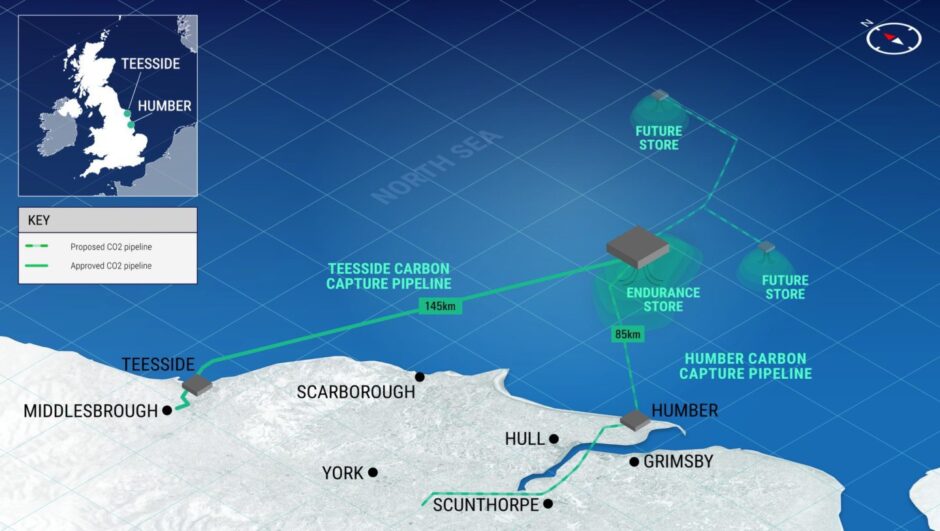
The permit is signed, the money pledged, and the starting gun effectively fired on a carbon storage project that will unlock £4 billion worth of contracts, drive investment in innovative technology and industries, prevent millions of tonnes of CO2 from entering the atmosphere every year and bring 2,000 jobs in the North East and tens of thousands more across the UK in the coming years as the CCUS industry grows.
There have been false dawns before, and debates will doubtless continue. But the government has made it absolutely clear that it is backing carbon storage – and here at the North Sea Transition Authority, we are turning ambition into activity.
The permit we have awarded sets Endurance and the Northern Endurance Partnership (Net Zero North Sea Storage Limited) on the path to first injection as soon as 2027, with consent to inject up to four million tonnes a year for 25 years, supporting the goal of decarbonising industry and helping the UK reach net zero by 2050.
A 143km pipeline will connect to vertical CO2 injection wells at the Endurance storage site, which is a Triassic Bunter Sandstone age saline aquifer 1,300m deep located some 75km east of Flamborough Head, off the Yorkshire coast.
In tandem with a second site off the coast of Liverpool on the Wast Coast, the projects will directly create 4,000 jobs and support 50,000 jobs in the long-term, as well as removing over 8.5 million tonnes of carbon emissions each year – the equivalent of taking around 4 million cars off the road.
The first oil and gas licences in the North Sea were awarded 60 years ago and since then more than 47 billion barrels of oil and gas have been recovered. This has brought massive benefits to the UK and oil and gas will continue to be an important part of our energy mix for decades to come.
‘Starting a new chapter’ in the North Sea
But now we are starting a new chapter for the UK’s energy industry, one that is focused on the transition, renewables and reducing our emissions.
It is a story that will build on the lessons of the past and link together the world-class energy supply chain and the world-class people that have been involved in the past decades – as well as opening a wealth of opportunities for the brightest and best new talent.
It is the technical expertise that delivered oil and gas projects for decades which will be the foundation for delivering on carbon storage, the same engineers and geoscientists are needed for both producing hydrocarbons and storing carbon dioxide.
But in getting this right, the UK can be a shining example of how to transition an oil and gas province into a clean energy super basin. The potential is clear.
The North Sea has the natural resources – 3.75bn barrels of oil and gas, a 60GW target for offshore wind, up to 78GT of carbon storage potential.
To achieve our storage targets we need to ramp up to an injection rate of 100 MT of CO2 a year by 2050.
The North Sea has the infrastructure – with key onshore terminals, offshore clusters and a world-class energy supply chain and world-class people that can link these parts of the story together.
The North Sea, most importantly, has the people. Those engineers, geoscientists and many others who had built the first chapters of the UK’s energy story – and exported their skills around the world – will now be writing the next chapter, along with a new generation of talented individuals.
Let’s be clear CCS is absolutely essential to the UK meeting its net zero targets. There is currently no credible pathway to reaching net zero without it.
Now we have signed the permit for Endurance. This is a huge moment.
The future is now, and the UK is leading the way.
 © Supplied by Equinor
© Supplied by Equinor